Focus on NJ Coworking: Growing Tigerlabs Community Promotes Fun and Drives Profits
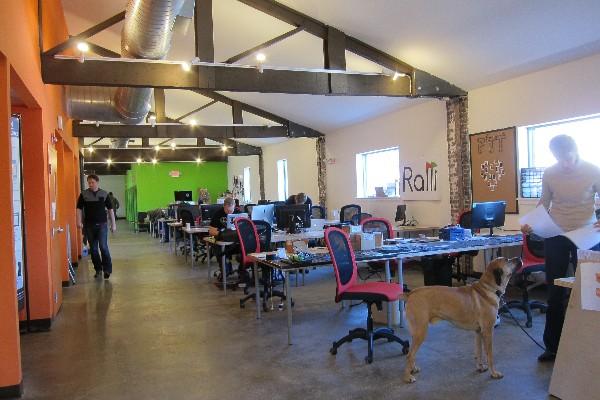
The burgeoning entrepreneurial community at Princeton’s Tigerlabs gives its members the best of both worlds.
On one hand, the coworking space, venture capital firm, and digital-health accelerator is “a really professional” environment, said member and wireless-technology consultant Paul Dietrich. “But on the other hand, there’s a lot of freedom for creativity,” he added. “There’s pets, and skateboards, and fun.”
Tigerlabs encourages entrepreneurs to bring their dogs to the coworking space, and members can often be seen riding skateboards around its open areas while they’re waiting for inspiration to strike.
But the facility also creates an atmosphere in which members like Dietrich are comfortable meeting with business associates. “I’ve seen work spaces where it’s gone over-the-top creative, but you can’t get your work done,” Dietrich said. “And I’ve seen spaces where it was just overly restrictive, and you can’t express yourself. So I think they have a good balance here.”
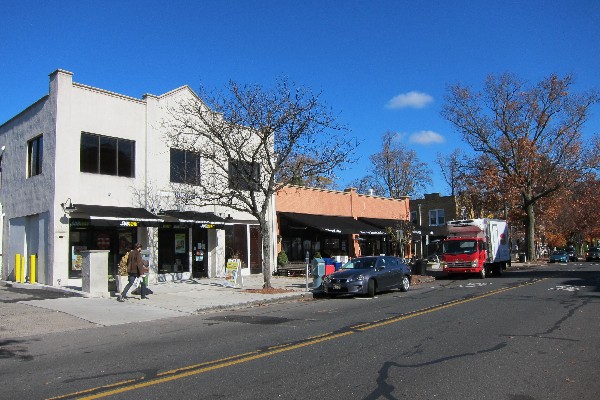
Tigerlabs sits across from Princeton University, on the second floor of 252 Nassau Street, making it easy for members to walk to a variety of downtown Princeton’s stores, restaurants and other attractions.
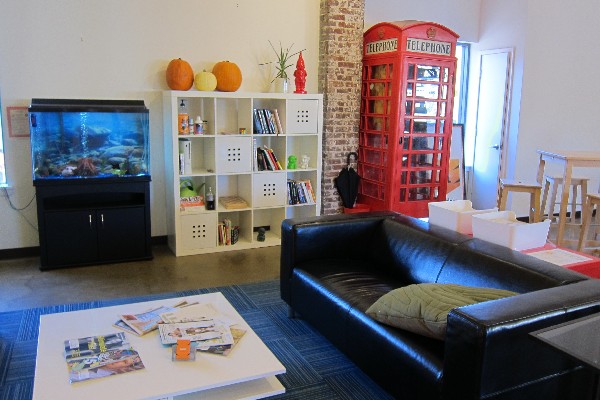
Most of the coworking space consists of one giant room, designed as a Brooklyn-style loft. The entrance to this loft is an open recreation area bordered by the reception desk, a conference room, and lounge seating. The middle of the loft contains work tables, where members can be found concentrating and collaborating. Across from these tables are the restrooms, which have showers for entrepreneurs working long hours.
The back of the giant loft, which contains more work tables, is separated from the front by sheer distance. Bert Navarrete, cofounder, CEO, and managing partner of Tigerlabs, explained that the separation between the front and back is meant to create “an imaginary transitional line.” This balances the open recreation space in the front “with a quiet and collaborative zone” in the back, he said.
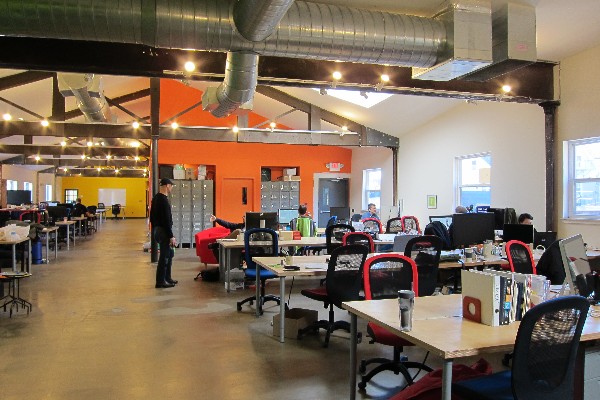
Several private offices and additional conference rooms line the back of the loft.
Trish Ryan, community manager at Tigerlabs, said that the loft is designed “to be very malleable,” and the furniture is easily rearranged when large events take place. These events have included several visits from Senator Cory Booker, who was most recently present for the NJ Tech Meetup/TechLaunch pitch event.
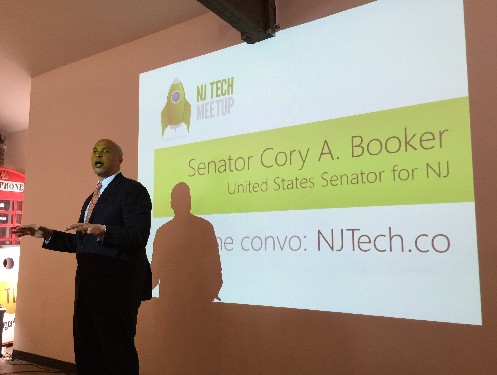
Other events at the space have included:
- The Startup Showcase, which is organized to show off the efforts of entrepreneurs affiliated with Tigerlabs
- Central NJ Drupal Group meetings
- Meetups of the Python User Group in Princeton
- javaScript.io Meetup events
- Monthly Ellevate meetings
- Monthly meetings of the Junior League of Greater Princeton
- Classes by Speakology, which teaches children communication skills
- Harvard Club of Princeton meetings
- Classes run by 8 and Up, a startup based in Tigerlabs that teaches entrepreneurship to children
“The intent is that this would be a center of activity for all things entrepreneurial” in and around Princeton, Navarrete said. And Tigerlabs has already become a resource for entrepreneurs at Princeton University.
“We have a great relationship with the Keller Center, which is based out of the engineering school in Princeton University,” Navarrete said. “So we cross-mentor a bunch of their programs and co-host a lot of activities together.”
Tigerlabs is also a principal sponsor of the university’s Entrepreneurship Club and its ACM Group, which focuses on computer science. “It’s very important to us that we’re deeply embedded in supporting the student entrepreneurs,” Navarrete said. This doesn’t just apply to Princeton, but to other universities as well, Rutgers among them.
For Rutgers, “we make ourselves available to coach, to judge, to participate in everything from hackathons, to pitch competitions, to business plan competitions,” Navarrete said.
Tigerlabs’ coworking members are also eager to support other entrepreneurs. Navarrete explained that, on one occasion, a member was coaching a Princeton student for the university’s startup competition. Other members were invited to listen to this student’s pitch, “and you had everybody show up.”
The coworking members certainly understand the entrepreneurial experience, given that they run a variety of their own startups out of Tigerlabs. These include Wattvision, a service that allows people to track energy use at up to 50 locations using a computer or smartphone, and Slickdata, which provides Microsoft Dynamics CRM consulting and solutions.
The startups at Tigerlabs have even helped some of its members find work. One of those members is Audrey Chen, a product management and marketing professional who grew up in Princeton, but spent roughly 10 years working in Silicon Valley.
When Chen moved back to New Jersey, “the first startup that I started working for was based out of Tigerlabs,” she said.
Chen also discovered the next startup she joined through the coworking facility. She said the variety of companies housed there is great “because I can basically be a hired gun for a lot of them.”
Altogether, over half of Tigerlabs’ coworking members work in the tech industry. And that’s fitting, given the facility’s origins.
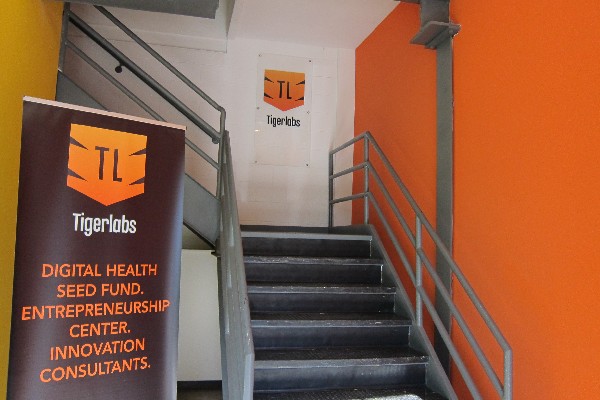
Tigerlabs started in 2011, when Navarrete and cofounder Jason Glickman formed a startup company called Connected Sports Ventures. This company built apps for smart televisions and mobile devices.
During the startup process Navarrete and Glickman looked for other entrepreneurs to work alongside—even though the others wouldn’t be working for the same company. Together, they all decided to share an office, “just so we could all be around each other and share some experiences together,” Navarrete said.
“We also were very keen to have an open-door policy for university students, because we felt very strongly that, by having the students involved, it would help create this atmosphere of creativity and community,” Navarrete said. “And really, that was the genesis of Tigerlabs. It started off as a very small shared office space on the other side of town.”
But it didn’t stay that way for long, and soon Tigerlabs also started acting as an accelerator. “The accelerator has been growing in parallel with our coworking space,” Navarrete explained. “In 2012, Jason and I were looking for engineers for our startup, and we decided to create a small, student-focused accelerator as an avenue to help accrue talent.”
Navarrete and Glickman received investment money to help them run a student-focused accelerator over the course of a summer. The summer program led to an infusion of capital that eventually allowed Tigerlabs to act as a full-time accelerator, with a focus on digital health care. “We wanted to run an accelerator that focused on digital health companies, given our proximity to big pharma and the health-care industry,” Navarrete explained.
Soon they needed a larger space to run more programs and events, so Tigerlabs moved to its current location in February 2013.
Tigerlabs now offers seed-stage investments to startups in a variety of fields, including digital health, media, advertising, education and finance. And as more entrepreneurs are drawn to the facility’s mix of fun and professionalism, “my expectation is that we will continue to grow every year, both in terms of numbers and programs,” Navarrete said.

